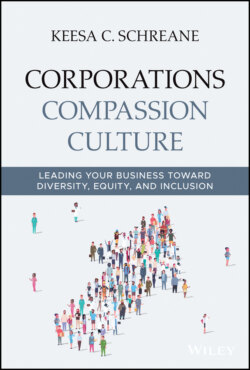Читать книгу Corporations Compassion Culture - Keesa C. Schreane - Страница 18
Making Tough Decisions Compassionately
ОглавлениеBut what happens when business pressures increase and, in the heat of the moment, a company's needs outweigh employee well-being and creativity? For example, there may be business expansion opportunities calling for employees to work for a period of time in a hazardous environment, with no health protection. Or a market downturn may occur when management foresees the need for employees to work longer hours to get a product to the market, but the company won't have the income to pay them right away.
Look at it this way: when business is booming, the economy is solid, and customers are buying in large numbers, it's easy to put employees first. Managers may even seek to share power, giving employees a say on how the organization's culture is governed. However, when revenue is on the line, the economy is tanking, and customers are unable or unwilling to buy products, typical corporate culture reverts to a hard-line approach. Managers are inflexible to the needs of employees and exclude them from decision-making.
In tough times, corporate culture can get even tougher on employees. What happens when an action that might inconvenience employees could nonetheless improve the company's long-term growth? Even for the most fair-minded business leader, profits will likely weigh more than compassionate treatment of employees in those examples. The scary thing is, in our super-competitive market environment, these scenarios have become more commonplace. C-suite leaders are making decisions about the health, well-being, and personal economies of thousands of people. These leaders see before them a limited number of alternatives to business problems. Each alternative has “casualties.” Consequences for those casualties can be debilitating.
Even in these situations, leaders should be tethered to their guiding principles dictating the type of leaders they are and the type of culture they uphold. Compassionate leaders are creative, engage a variety of stakeholders for feedback, and use their intelligence and imagination to deliver the best results. They see people as their most valuable resource. Their guiding principles include cultivating people.
The root of the problem is that business leaders resort to thinking of employees as expendable, instead of viewing them as the lifeblood of the business and should be treated with compassion and dignity, even in arduous circumstances when there are no “good” options to choose from. Commoditizing people in the workforce, and not adhering to a people-first business mentality, has steadily eroded corporate culture. Today, corporate culture is slowly shifting toward more of a people orientation. But, to return to our ship-turning analogy: this change won't happen overnight. There are still plenty of corporate leaders who instinctively view shareholders as the primary (if not sole) concern in decision-making.
There is always room for grace here. Making poor decisions does not equate to intentionally desiring to harm employees. In fact, it's possible the majority of leaders feel they have no choice when making decisions that negatively affect employees. They may not have the resources and information needed to expand their view of business solutions in challenging environments.
